- Home
- Robin McKinley
The Outlaws of Sherwood Page 3
The Outlaws of Sherwood Read online
Page 3
Robin shrugged. “It matters not. What is done is—done.” And then the sight of Tom Moody clutching at the feathered shaft rising from his red-stained tunic was before him, and the shrug turned to a shudder and he closed his eyes.
Marian’s hands shifted and tightened on his shoulders, and she said softly, “What happened, then? We know you met with trouble, dark trouble, but we do not know its name.”
Robin looked at her in surprise. “You don’t know? You—” But he could not get the words out.
Much said, “My father’s friend thought they might accuse you of killing the king’s deer; someone was bragging that he had stolen one of the arrows you’ve made from Sir Richard’s son, who was too drunk to notice.”
Marian whispered, “That’s a hanging offense—if they could do it.”
“They could do it,” Much said briefly, and a little silence fell.
Robin could hear his friends trying not to make the silence too hectic with expectation. He shook himself free of Marian’s hands and took two steps back, carefully not looking at his friends’ faces. “I—I killed Tom Moody. I killed him.” Then he turned and knelt stiffly by the stream, and bent over for another drink; not because he was thirsty, but because it gave him something to do. He had said aloud the awful thing that he had done, and the saying, in some way, made it irrevocable, as it had as yet not been. Or, no, he thought, dipping his hand into the freezing water again. It is not that I have doubted the thing I did; it is that I have acknowledged the burden of it now, by telling my friends of it.
Marian sat down beside him, heavily, as if the spring had gone out of her muscles; as if she, too, had run for hours. Much said, over their heads, “How did it happen?”
Robin told them, haltingly, but he told them, and he tried to tell everything, leaving nothing out but that this was only the latest, last, and worst of his trials under the Chief Forester who had hated his father. Last. His heart even tried to lift a little at that thought: whatever came next, he would never have to take orders from the Chief Forester again. “It is, at best, a very stupid thing I did.”
“It is stupid only because you lived and he did not,” Marian burst out. “He meant to kill you—he would have killed you if you had not stumbled.”
Robin rubbed the back of his neck thoughtfully. The arrow-crease burned with the salt of his sweat. Marian began plucking up the small weeds and grasses that grew on the bank of the stream, and casting them angrily into the water.
Much said, “My father came out of the mill and called me just before I was to set off; there had been several folk there who had just left. He said, ‘You are meeting your friend young Robin at the fair today, are you not?’ and I said I was. ‘Tell him then to have a care; for I have heard that the friends of the Chief Forester have a mind to remove him from their master’s sight, and beyond any man’s care.’”
“I wonder he did not kill you outright, at the very beginning,” Marian said, tearing a particularly long weed into bits before she flung it into the water.
Another faint smile crossed Robin’s face. “That would not have been nearly so enjoyable,” he said. Marian’s fingers paused. “What should we do now?” Robin gingerly stretched one arm and then the other; they felt like blocks of wood, and creaked like badly hinged blocks of wood, although wood, presumably, did not ache like this. He thought that perhaps he felt as he would if Tom had held to the original plan of merely beating him—but from Much’s words, that had never been the plan. He wondered if there was some comfort in this, but he was too tired to consider it. “We should not do anything; though I am very glad to have seen you one last time. I would not have dared to come looking for you. You should go home, and forget you ever saw me this day, and—”
“And you will go sell yourself to the Saracens,” Marian put in. “Well, you won’t. We came to help you, and help you we will.”
“And you can’t stop us,” said Much, with almost a grin. “It is hard for you, Robin, but you know, this could almost be a good thing in the long run—”
“A good thing?” exploded Robin. “A man is dead, and—”
“And his death is going to give the Norman dogs an excuse they’ll love, to bite down on us Saxons; yes, I know. But there’s another side of it. Everyone hereabouts knows who your father was. It would be an easy thing to put it about that the trouble you’re in comes of being your father’s son; that the lying Normans can’t bear an honest Saxon around them long—and it’s the truth, too. So, if word goes round that Robin, son of Robert Longbow, is—is living free—well, I think a few hardy like-minded folk might wish to join him. The Nottingham woods are huge; quite a few of us could lose ourselves in them beyond ken of any sheriff’s or king’s men forever. I think a few hardy like-minded folk might be pleased.”
“Pleased? Pleased to do what?” Robin said, throwing a few weeds of his own into the brook, despite the ominous creaking through his back and shoulders. “Pleased to skulk around in the shadows, pleased never to have a roof or a home, or anything over their heads but a price to see them dragged before the sheriff? This kind of talk was amusing when we were children and didn’t know any better, Much. You always told the best stories—I envied you the way you told them, the way you believed them. But that’s long ago—more than just years. It’s nonsense. You must know it’s nonsense.”
“It’s not nonsense,” Much said patiently. “You’ve been too preoccupied with staying out of the Chief Forester’s way for too long to listen to us. Henry had stopped caring about anything but quarrelling with his sons by the end; Richard stayed in England barely long enough to be crowned, and then it was off to the Holy Land—”
“Henry gave us the law,” argued Robin, “and Richard is an honest man.”
“Richard is an honest man in Palestine,” said Much, “and what we have is a Regent who is not. Do you suppose one of Henry’s handsome travelling justices is going to listen to a lot of ragtag Saxons against the word of a Norman sheriff who is a personal friend of the Regent? Think, Robin. You could be our rallying point.”
Robin shook his head. “It sounds fine,” he said. “I’m sure you are often in demand as a fireside speaker. But it won’t work.”
“And if we are going to put it to the test,” Much continued without heeding, “this is the season. It’s spring; we have summer and autumn ahead, when staying alive will be easy, and we have time to make mistakes before winter begins, and we’ll have to be serious.”
“Be serious! It is you who are not being serious,” said Robin. “Have you given any practical thought to your shining notions of Saxon revolt against Norman tyranny? It is too late for me, so I do not matter. But do you have any idea what using me as a so-called rallying point would mean for those who rallied? Do you understand how absolute the no going back would be? I can’t believe that you do, or you would not suggest it. What kind of a man do you suppose me to be, that I could permit these ‘hardy like-minded folk’ to come to me, knowing that by so coming they could be hung for my offense if they were caught? Hardiness alone grants you no woodscraft, and woodscraft—do you understand what the isolation of living in Sherwood would mean? It would be a short life, for one thing: we would only be able to kill the king’s deer to feed ourselves for as long as our arrows held out, for we would not be able to buy steel and twine to make more. Even if we knocked a travelling fletcher on the head for his supplies, where could we leave the wood we need for shafts to season, when we had not even a place to sleep dry? We could not build anything, for large as Sherwood is, I can tell you that the foresters might find their way to any part of it by lucky or unlucky chance; it is what we are for. Is what they are for. And they will hear the same rumours that your like-minded folk will, and they will be looking. The occasional rogue in Sherwood is a common thing and no one cares overmuch so long as he kills no one important; but an entire band of them, waving a banner saying ‘Down with the Normans’ virtually in the sheriff’s teeth? Be sensible, man.”
“This is why we need you,” said Much comfortably. “You’re a pessimist and a good planner.”
“I have not begun to plan and be pessimistic,” said Robin angrily. “You are simply not listening; you wish to ignore me—beyond my symbolic status, of course, which you find valuable—because the price on my head, you think, is oppressing my spirits—as it damn well is, I agree, and as it should. Stop telling yourself beautiful stories, Much. How many examples do I have to give you before you will listen? Perhaps after we run out of arrows we can learn—before we starve—to make snares out of gut, to catch our food. Perhaps. But are we to raise our own sheep for wool to make our clothing? Do any of your like-minded folk know how to card and spin? A meadow, deep in the heart of Sherwood, full of sheep that don’t seem to belong to anybody might cause a little curiosity too. And where did the sheep come from? Do we steal lambs from the farmers who are already being taxed past bearing by the sheriff who wants my head? In that case we might as well go on stealing lambs—and calves and chickens—and eat them too. I’m sure snares would be a nuisance. Of course then we wouldn’t make so grand a rallying point for our fellow Saxons. We would look, from the farmers’ perspective, quite a lot like Normans.”
Much and Marian exchanged glances. “We will not be entirely cut off from the outside world,” said Marian carefully.
“You cannot be a part of this madness, Marian,” said Robin sharply; “you always had less patience with Much’s will-o’-the-wisps than I did.”
“Nor am I an overtaxed farmer or an outlaw in hiding?” said Marian. “It is possible that it is exactly that that leaves my head clear now to judge what you cannot judge—”
“Judgement!” said Robin. “Neither of you is judging anything. Neither of you wishes to look past a friend in trouble, and I honour you for it, but there is no future in it—I must make you see that there is no future in it.”
Much said, “You are right that not everyone who believes in us will have both the strength and the desire to live as an outlaw—I do know what you’re trying to say. But we will not be completely isolated. We will be able to get arrowheads and wool and other things through our friends.”
“Bought with leaves and twigs?” inquired Robin.
“Our skills will still be saleable; it is the marketing that must be done by others,” said Much.
“There is, of course, a great deal of call for bagging flour and meal in the king’s forest,” said Robin.
“You can still make arrows,” said Much. “One of my friends, Harald, is a leather-worker, caught in a position something like yours might have been under Will Fletcher. There are other examples. And I—oh, I can experiment with snares. And someone will have to dig privy vaults. You see? I do have some notion of what I’m proposing.
“But I’m not going to argue with you tonight. You’re tired; you couldn’t be anything else. You can sleep in the old barn at the mill tonight, and tomorrow night as well. Just promise us—for this evening—that you won’t try to sacrifice yourself to your stubborn idea of justice to a Norman king. No sacrifices till you’ve had at least one good night’s sleep, and something to eat.”
“And have let you talk at me some more,” said Robin.
“That’s right,” said Much.
There was a long pause. Robin looked at his two friends, seated now on either side of him, and it occurred to him that they were going to take him into custody as inexorably as any king’s foresters might: their faces told him that. “Oh, to the devil with you, and your troop of merry bandits with you,” he said. “I promise.”
CHAPTER THREE
Robin woke up with an intolerable headache and a sense of impending doom that it took him a few moments to define. When he had remembered the events of the day before, fear tried to shoot him bolt upright—and his abused body, which had turned to stone overnight, jerked an inch or two in its bed of straw and refused to move further. The jerk, however, woke up a great many more, not only physical, protests, that cast the headache into comparative shadow. Robin lay still, staring at the roof, and his thoughts were bleak.
He rolled over—cautiously—at last, and found lying beside him not only a loaf of bread and a bottle of water, but his father’s bow, still in the wrappings he was used to keep it in.
He ate the bread, drank the water, and contemplated the bow. He was still too tired to think sensibly—he felt as if the night before had been more a period of unconsciousness than of sleep—and his bruised emotions could not decide if they were chiefly of gratitude for the mysterious rescue of the one possession that meant more to him than any other, or fear of finding out how, exactly, it had been restored to him.
He muffled a sneeze. He was stowed away in the smallest, highest loft in Much’s father’s old barn; in Much’s grandfather’s day they had kept a few beasts, but the mill’s custom had increased to the point that the animals were more trouble than they were worth when the miller could trade for anything he might need. “If there had been six of me instead of only me and a few sisters,” Much had said once, “that barn might still be used; but there isn’t, and there’s more than work enough for my father and me at the mill.” Robin thought of that now: and Much was suggesting that he turn his back on his father, to run wild in Sherwood. He had tried to balk the night before, when Much brought him home; Much was known as a friend of his, the sheriff’s men would come to the mill to ask—possibly to search. “Oh, they’ll come and they’ll ask,” said Much, “but they won’t search. You don’t know my father when he plays stupid. He’ll be beautifully offended when they ask if his only son might be harbouring any known criminals, and he’ll be even more offended when they suggest, none too gently, as gentleness is not part of their training, that they might just have a look in the old barn. He’s still the miller hereabouts; they’ll leave him alone for now—and now is all we need.”
The straw in the loft was older than he was; it was hard to tell if his tongue would have tasted mouldy this morning anyway, or if the un-subtle flavour was a result of breathing ancient strawy dust all night. He muffled another sneeze, and crawled to the edge of the loft to look down. A shadow darkened the narrow doorway, and he flattened himself immediately; but it was only Much.
“You’re awake, then,” his friend said softly. “I was beginning to think that what we do with you next was irrelevant because you were going to sleep for the rest of your life. Are you feeling any better?”
“No,” said Robin.
“Oh. Well, it’s a bright clear day out, my father dispatched the sheriff’s men without half trying—a timorous lot to be sure, to be set hunting a desperate man—and some of my friends are coming round tonight to talk to you.” Much had climbed the first rank of wall beams as he spoke—the ladder that would bring him the rest of the way to Robin’s loft was in the loft with Robin—and his head was now only a little below his friend’s as Robin hung over the edge.
“How did my father’s bow get here?”
“I brought it up when I brought you breakfast,” said Much.
“You know what I mean.”
Much would not meet his eyes. “You’ll have to ask Marian. She’ll be here tonight.”
“She’ll—what? She’s not to get mixed up in this.”
Much’s face was invisible as his fingers groped along the edge of the loft for the legs of the ladder. “I seem to have pushed it a little too far back,” his voice said. “If you could—”
“Did you tell Marian she could come?”
Much’s face re-emerged, looking cross. “You don’t exactly tell Marian she may or may not do things.”
Robin had noticed at their parting by the stream the night before that she seemed preoccupied; but there was an abundance of material to be preoccupied with. Much was leading him off to his refuge, Marian said only, “Good night,” as she left them, and Robin, too tired to do anything at all—including follow Much—assumed that she was going home, and was relieved that she had gone so quietly. He had been afraid she w
ould insist on coming with them, and every minute she was in his company was another minute’s terrible danger for her. If he had been more alert, he might have noticed a gleam in her eyes.
“She is not to get mixed up in this,” he repeated.
“You get to tell her that,” said Much. “Never mind the ladder; you’re not fit for conversation if you’re going to brood, and there’s work waiting at the mill.” He stared, exasperated, at his friend’s inward-looking face for a moment. “Robin, I do know enough not to know what you’re going through just now.” Robin’s gaze flicked back to him. “But—don’t take it out on Marian?”
Robin said nothing. Much shook his head, and started to climb down. “When you need to go out—the back of the barn’s sheltered from any peering eyes; there’s a broken board you can squeeze past.” He reached the floor. “Try not to drop the ladder; we might hear it at the mill, and mice and bats don’t drop ladders. I’ll be back to bring you indoors after dark.”
Much’s two sisters still at home were bundled off to stay with friends, and his father, who knew about the temporary occupant of the old barn, tactfully (and strategically) left the house to his son and what friends might appear. Did anything go wrong with the evening’s affairs, he would have been seen by at least a dozen of his own acquaintances, safely and innocently drinking ale and discussing crops at the Singing Lark on the road to Nottingham.
Marian was the first to arrive, and this did not help Robin’s mood. He had meant to be calm and well-reasoned, although he was already angry that she should so casually (he thought) continue to put herself in danger by associating with him, and while he began by asking only how his father’s bow had come to him, his own voice sounded curt in his ears.
She did not react to his tone, although she looked at him sidelong. She had simply stolen Robert Longbow’s bow out from under the sheriff’s guards’ noses, for what had till yesterday been Robin’s little holding had been under close watch by yester eve. She had done it at black midnight, after Robin and Much were both asleep. The very manner of her telling infuriated him, for she spoke flatly, and made no acknowledgement of her foolhardiness. It infuriated him further when it occurred to him that even had he noticed a suspicious gleam in her eyes the night before, there would have been nothing he could have done about it. When he began to remonstrate with her, she cut him off impatiently.

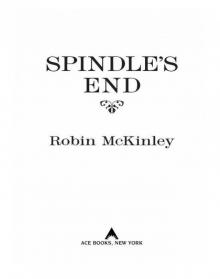 Spindle's End
Spindle's End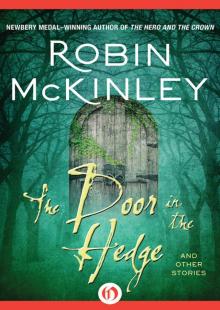 The Door in the Hedge: And Other Stories
The Door in the Hedge: And Other Stories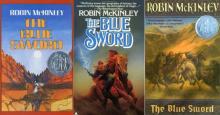 The Blue Sword
The Blue Sword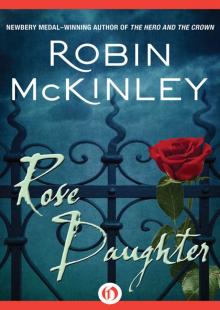 Rose Daughter
Rose Daughter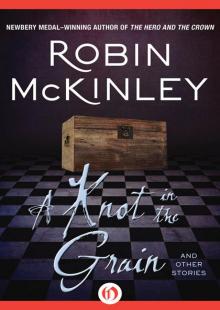 A Knot in the Grain and Other Stories
A Knot in the Grain and Other Stories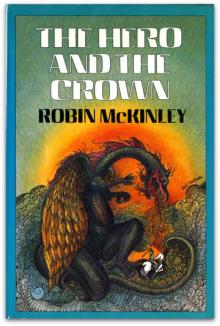 The Hero And The Crown
The Hero And The Crown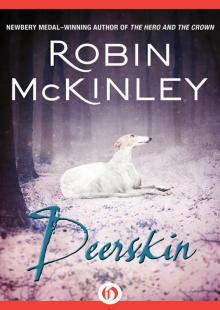 Deerskin
Deerskin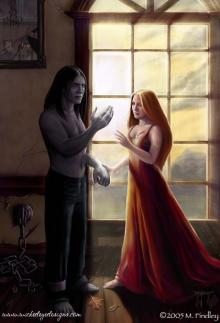 Sunshine
Sunshine Beauty: A Retelling of the Story of Beauty and the Beast
Beauty: A Retelling of the Story of Beauty and the Beast Shadows
Shadows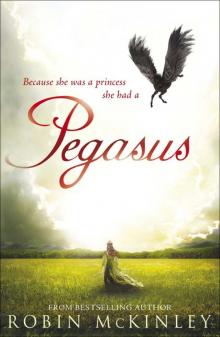 Pegasus
Pegasus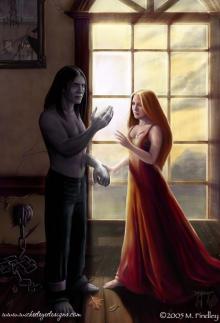 Chalice
Chalice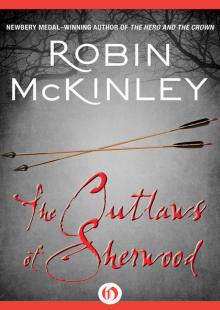 The Outlaws of Sherwood
The Outlaws of Sherwood Fire: Tales of Elemental Spirits
Fire: Tales of Elemental Spirits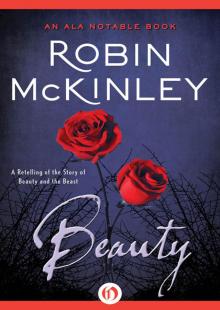 Beauty
Beauty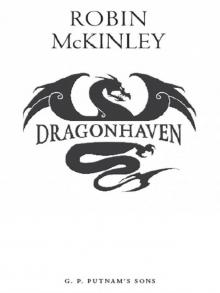 Dragon Haven
Dragon Haven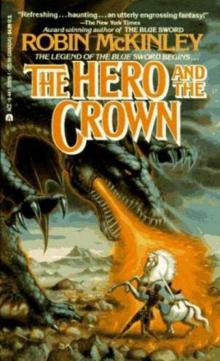 The Hero And The Crown d-2
The Hero And The Crown d-2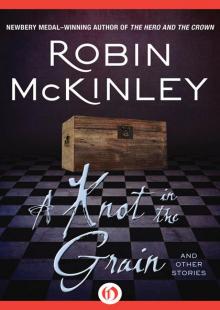 A Knot in the Grain
A Knot in the Grain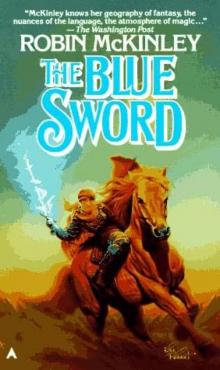 The Blue Sword d-1
The Blue Sword d-1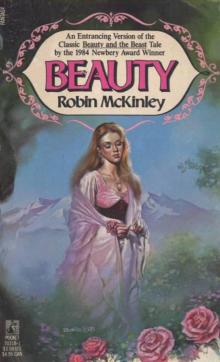 Beauty (v1.2)
Beauty (v1.2)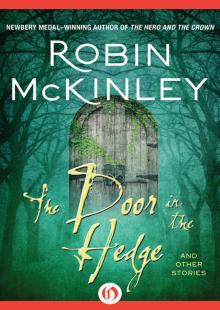 The Door in the Hedge
The Door in the Hedge